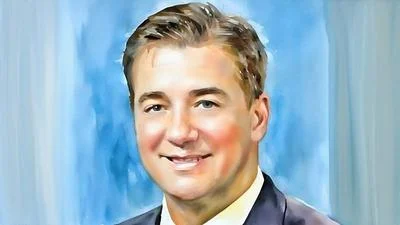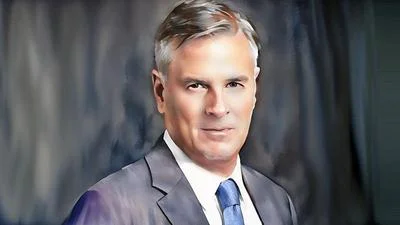Ray Ficca is the president of the National Conservatory of Dramatic Arts. He is an actor, director, producer, writer, and songwriter.
This transcript has been edited for length and clarity.
Federal Newswire: What are the main challenges art students face economically?
Ficca: There are many challenges. We're an accredited acting program and we're accredited like a technical school. The business of the arts is a risky business. My wife and I run the place. Our goal was to do everything we possibly could to keep tuition manageable. We didn't want to saddle folks going into the arts, which is such a difficult business financially, with $40,000-$70,000 worth of loans. If you went to a similar program in New York City, you would probably pay three to four times the amount in tuition alone. Dues are fantastic programs, but that's probably our biggest challenge financially. Our kids [are] in their 20s. Our median age is 27. We get folks who are as old as 70 who want to change careers or develop a new career. We have students come from Baltimore all the way down to Woodbridge, Virginia, and a mix of every demographic that you can imagine. We're all working towards the same goal, which is to build creators in the arts. I tell the students we've got a contract. My job is to prepare you from A to Z, and how to be a professional artist. Your job is to show up and do the work. That's our contract. And proudly, we're still here with all the turbulence of the pandemic and the changing of the arts. Our biggest challenge is to keep tuition low so a kid from the KIPP school, Anacostia High School,Ballou, or Duke Ellington can come here and have a manageable tuition situation. In New York it could be $25,000 a semester. It's $5,000 a semester here, a manageable situation, and they get exposed to all the tools that they need. All the practice they need is a lot like training for a sport to go out there and present themselves and to make their way in the arts.
Federal Newswire: How can art students succeed financially?
Ficca: In the arts these days, you have to be your own advocate and you have to be your own creator. That's what I got from my dad. He said, “make sure you're the best you can be,” which is great advice. “Be a gentleman,” which is also great advice. Be a gentleman all the time in your life and things work out very well for you. He also said, “you've got to find your way because nobody else is going to do it for you unless you're making them a lot of money.” Creators, entrepreneurs, [and] every actor walks out of here say[ing], “you are your business.” Now go create and go fill the niches that have to be filled and go be the best you can be with the information you've been given.
Federal Newswire: How can someone who's in finance, politics, or science, take a page out of your playbook to learn from others?
Ficca: Everyone should walk into a classroom with 22-year olds because you have to listen to them. You have to understand where they're coming from before they'll even give you the time of day. So in business and in finance, you listen. Because there's always one tidbit that you'll walk away with, even if I don't think I want everybody thinking like that. In business it can get lost because your eyes [are] on a prize. But sometimes you forget what's along the road in the journey.
Federal Newswire: Who can attend your school?
Ficca: Right out of high school, actually. We've become quite the popular gap here, which I think is tremendous. A lot of parents come to us and say, “my son or daughter wants to get into the arts.” They feel a little nervous about that because college is such a big expenditure. So they come here for a year. They can see if they like it [because] we're more rigorous than any college program. Depending on the college, credits–because we are accredited–are transferable. The local Virginia colleges have been fantastic to us [and] to our students. There's a lot of competition with colleges now, so that's not such a bad thing. We also accommodate the GI Bill. We get a lot of folks when they retire or they do their four to 10 years say, “okay, I want to go try something else.” [Then] they come here and work in the Washington, DC area, [which] is great because, although it's too expensive to film a lot of TV or movies here, I can't tell you how many government training films I've done. I just did one down at the Folger Theater…I worked with the FBI, the TSA, [and] NIH. That is very popular work in this area and we have a really wide net here. A lot of the producers call me and say, “okay, I need this type, this type, and this type,” which is another thing we have to get in students' heads. Somebody can be really good, but if somebody is looking for another type, don't take it so hard. But people want different things.
Federal Newswire: Should these young adults at 18-20 think differently about university or think differently about college?
Ficca: I said to myself, “Montgomery Community College has one of the best acting teachers in the area.” [A] gent by the name Sasha Oleic. He's fantastic, and what a great path. These kids have so much opportunity. I think they should [test]-drive their education a little bit more than what the norm was when we were growing up, because it's out there, and I will tell you this, Bergen Community College [had] the best history class I ever had. I took a history class at Bergen Community College in New Jersey on Hitler in World War Two and I was stunned how much I learned in that because it was summertime. So yes, students must look at different alternatives because some people say this is the smartest generation. I'm not sure about that. They are clever [and I] know they see things we don't. They have a horrible sense of history, but they have their niche. They can do what we can't do. So it's out there, go find [it]. I am a good patriot, [and] there's no better place than the US. It's out there, you go find it. From the show chorus line, when there's one girl in the one acting class in high school and the teacher's too hard on her, he's being very harsh and very unfair, the angel comes down to her shoulder and says, “go find a better class”, because it's out there. I've worked a lot with Montgomery Community College and a lot of good things happen here and happen in small places like this. We're in Georgetown, so down the street at Georgetown, up the street at American, or across town at Catholic. I wish their theater students could have our experience.








